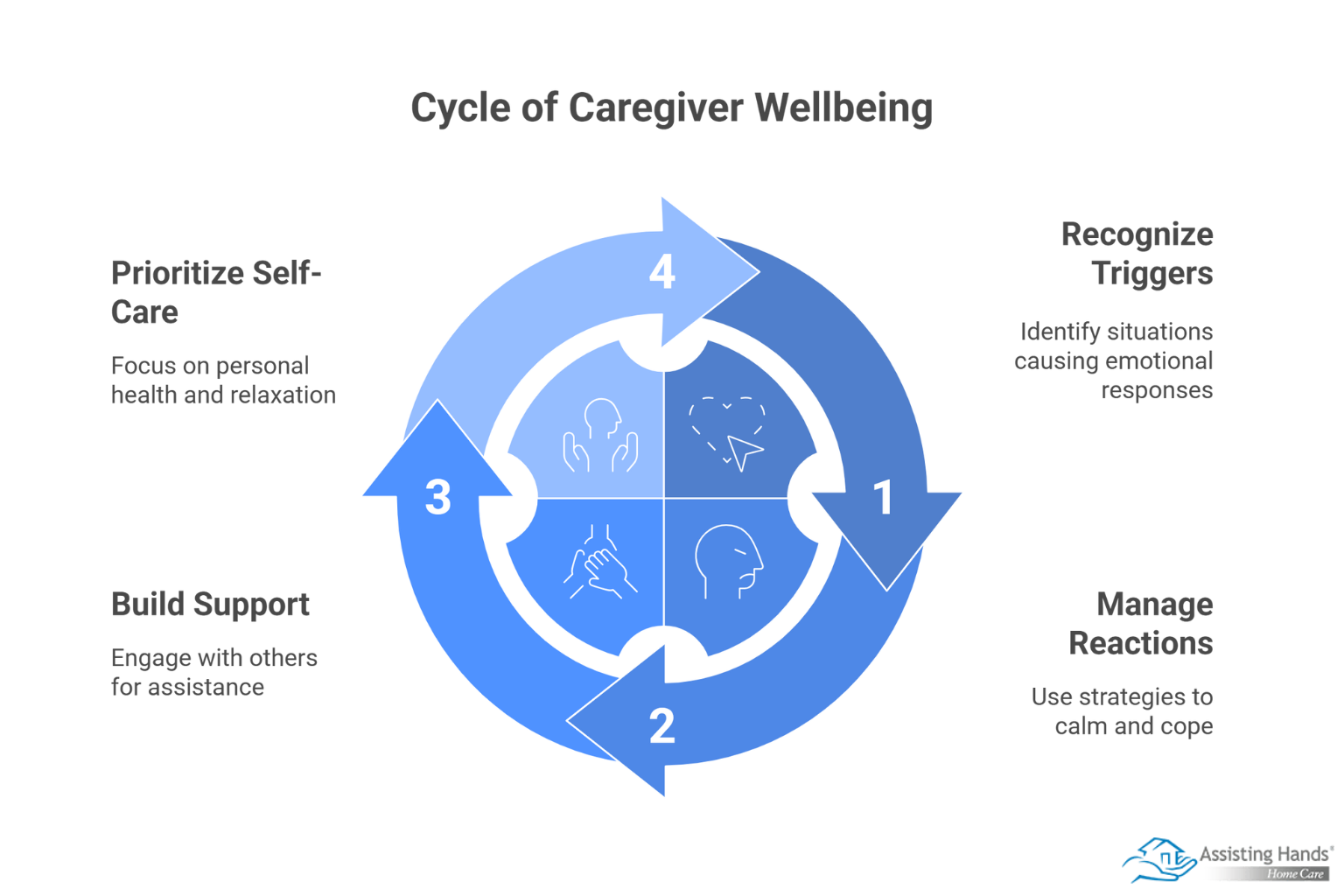
Table of Content
Caregiving is an act of immense compassion and love, but it’s not without its challenges. Emotional triggers can arise from the physical, emotional, and mental strain of caregiving responsibilities, leaving caregivers feeling overwhelmed or burned out. Understanding and managing these emotional reactions is essential to maintaining personal wellbeing while providing the best care possible.
Understand Emotional Triggers in Caregiving
Emotional triggers are intense responses to situations or events that typically stem from past experiences or existing stressors. For caregivers, these might include feelings of guilt, frustration, or sadness when situations don’t go as planned or when faced with recurring challenges.
For example, you may feel anger when your caregiving efforts aren’t appreciated or guilt for wanting a break. Similarly, witnessing the decrease in a loved one’s health can evoke profound sadness or helplessness. Recognizing these triggers is the first step in addressing them effectively.
Seniors can face a variety of age-related challenges. Though some families choose to take on the caregiving duties, there may come a time when they need a trusted homecare services provider. Families sometimes need respite from their duties so they can focus on their other responsibilities, and some seniors need around-the-clock assistance that their families are not able to provide. Assisting Hands Home Care is here to help.

Identify Your Individual Triggers
To manage your emotions, you first need to identify what triggers them.
- Journal your reactions – Keep a daily log of moments that elicit strong emotional responses.
- Reflect on patterns – Are there specific tasks, actions, or behaviors that consistently lead to stress? Perhaps addressing challenging behavior or managing resistance from your loved one amplifies certain emotions.
- Explore past experiences – Sometimes, your emotional responses are tied to unresolved feelings or past experiences. Identifying these connections can help you better understand why certain situations feel overwhelming.
Acknowledging your triggers without judgment creates opportunities for positive change.
Address Negative Emotional Reactions
Once you’ve identified emotional triggers, you can begin managing them with practical strategies.
- Take deep breaths – When a trigger arises, pause and take slow, deep breaths to calm your immediate physiological response. Deep breathing can lower your cortisol levels and put you in a better mental space to address the situation.
- Set boundaries – Being overextended can exacerbate triggers. Learn to say no when needed and delegate caregiving duties whenever possible. Setting boundaries will enable you to create a healthier balance between caregiving and your personal life.
- Adjust your expectations – Perfection isn’t attainable, even in caregiving. Accepting that some days will be more challenging than others can reduce feelings of guilt or frustration. Focus on progress rather than perfection.
- Practice self-compassion – Speak to yourself with kindness, just as you would to a friend. Acknowledge the effort and love you’re putting into caregiving, even when things don’t go smoothly.
Build a Support Network
Caregiving doesn’t have to be a solo mission. Having a support system makes a world of difference in managing emotional triggers.
- Family and friends – Lean on people you trust to share responsibilities or to simply listen when you need an outlet.
- Support groups – Many communities offer caregiver support groups where others share similar experiences. Attending these can help you realize you’re not alone in your challenges.
- Professional support – A counselor or therapist can provide tools to process difficult emotions and guide you in developing effective coping mechanisms.
Engaging with others who understand what you’re going through fosters connection and reduces the weight of isolation.
If you’re feeling stressed and overwhelmed by your caregiving responsibilities, a professional caregiver can provide the support and encouragement you and your loved one need. Families looking for top-rated Reston senior home care providers can reach out to Assisting Hands Home Care. From respite care to specialized Alzheimer’s, dementia, stroke, and Parkinson’s care, there are many ways we can make life easier for seniors and their loved ones.
Prioritize Self-Care
Caregiving can often push personal needs to the back burner, but neglecting self-care makes you more vulnerable to emotional triggers.
- Schedule regular breaks – Even short periods of relaxation can recharge you mentally and physically.
- Engage in hobbies – Pursue interests outside caregiving, whether it’s reading, gardening, or exercising.
- Focus on health – Proper sleep, nutrition, and physical activity are essential for managing stress and maintaining resilience.
By prioritizing self-care, you not only safeguard your health but also become a more effective caregiver.
Family caregivers need to care for their own wellbeing. Whether you need respite from your caregiving duties or your aging loved one needs live-in care, Reston, VA, Assisting Hands Home Care can meet your family’s care needs. Our dedicated caregivers are available around the clock to provide transportation to doctor’s appointments, ensure seniors take their prescribed medications, and help with a variety of tasks in and outside the home.
If your senior loved one needs assistance with the challenges of aging, reach out to one of our knowledgeable, compassionate Care Specialists today.








